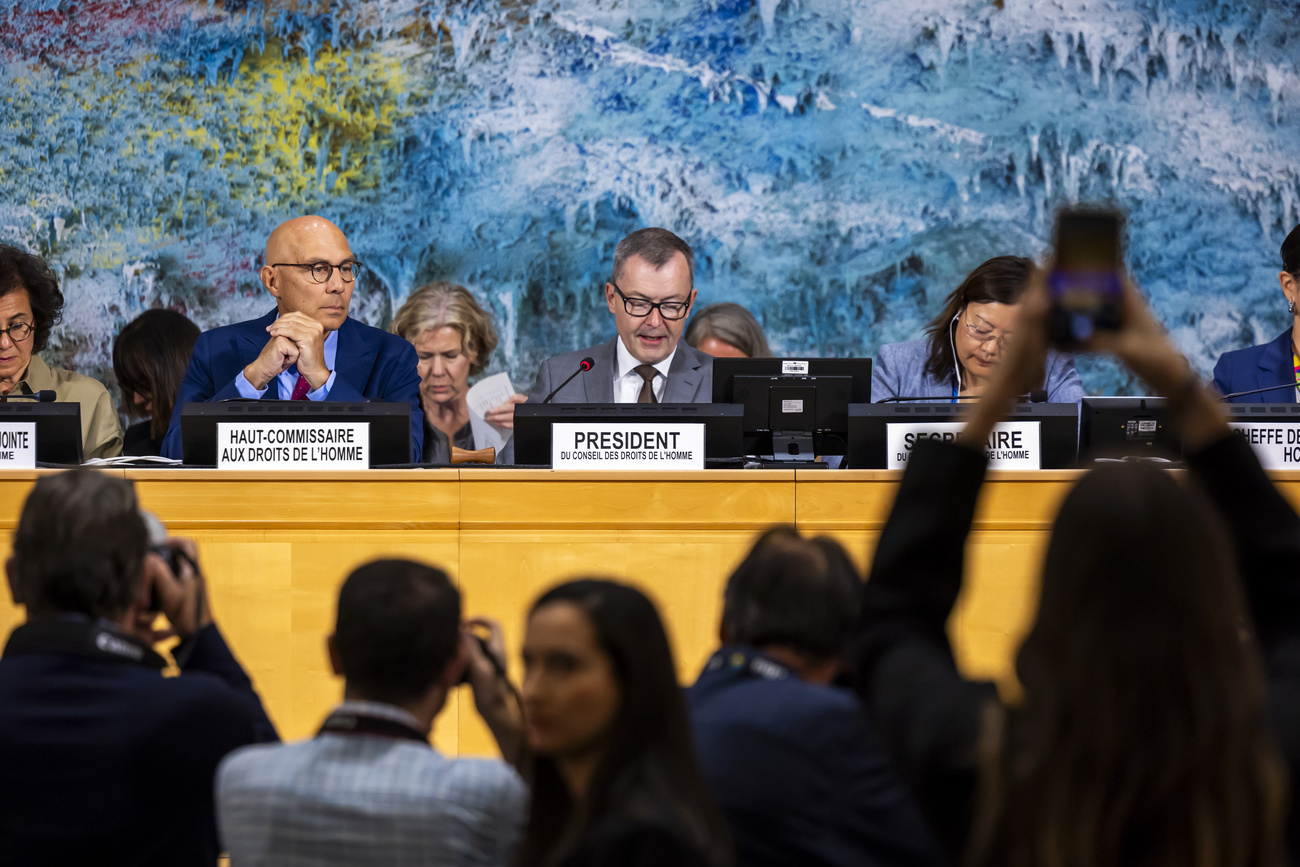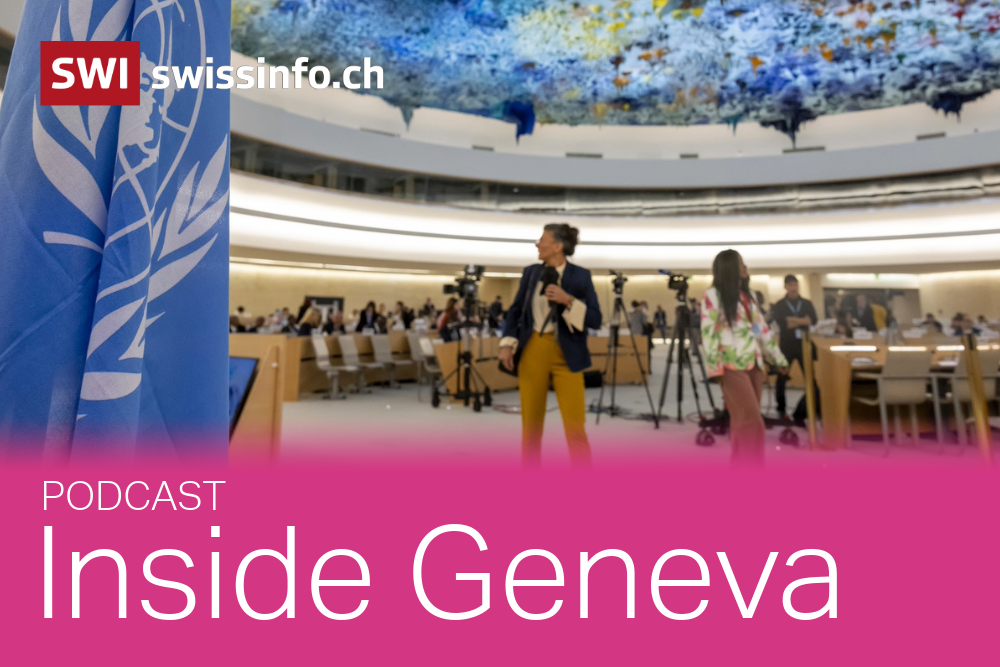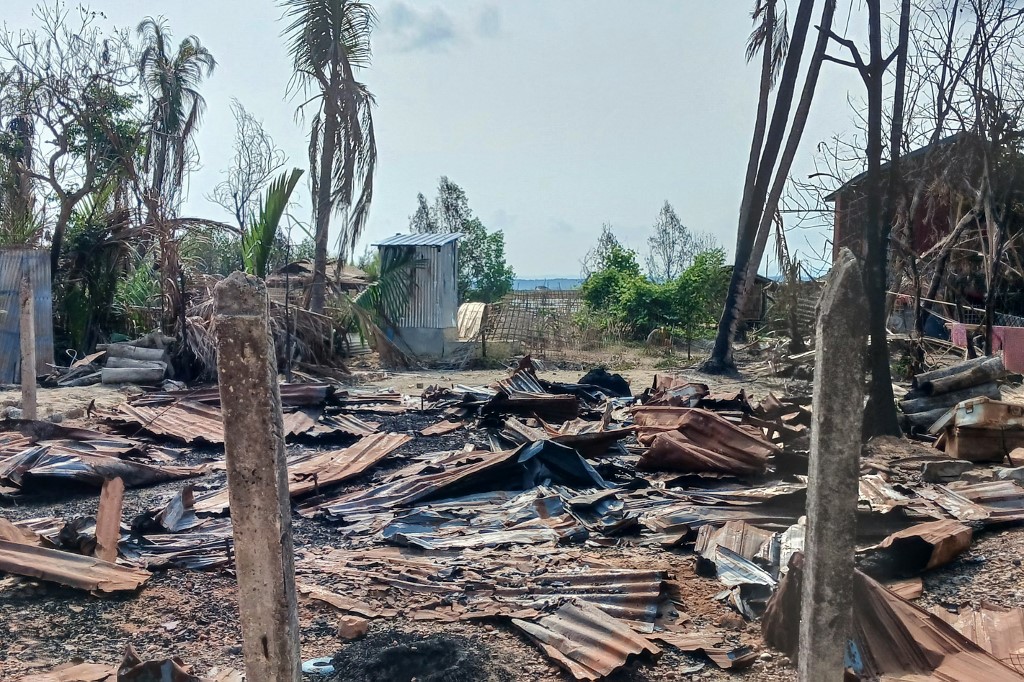
Human Rights Council meets in Geneva amid budget crisis

The UN’s main human rights body has begun its final session of the year in Geneva against the backdrop of a budget crisis and rising geopolitical tensions.
The Human Rights Council (HRC) began its last session of the year on Monday in Geneva. Until October 8, the 47 member states of the UN’s main body for the promotion and protection of human rights worldwide will review a long list of countries and issues demanding their attention.
The session takes place in a tense geopolitical context and is once again marked by the wars in Gaza, Ukraine, and Sudan. Added to this are the UN’s financial difficulties, as well as various proposed reforms which affect – and which will continue to affect – the council’s work.
“We will cover the entire agenda, but more efficiently and quickly,” said Swiss Ambassador Jürg Lauber, who is presiding over the HRC this year, at a press conference. As during the previous session in June, speaking time and the number of delegations allowed to take the floor will be reduced to save time and costs, Lauber added.
Liquidity crisis
By the start of September, only 124 of the UN’s 193 member states had fully paid their annual contributions to the organisation’s regular budget. Neither the US nor China – the biggest and second biggest donors, respectively – are among them, and some fear that Washington may simply fail to pay its share.
As elsewhere in the UN, where expenditures are expected to be cut by around 20%, the HRC must also make savings. This affects both the organisation of its sessions and the implementation of what it decides. A fact-finding mission on the Democratic Republic of the Congo, approved earlier this year, has not yet been launched due to a lack of funding.
Asked about the impact of the cuts, Lauber said he had “mixed feelings.” While he welcomed efforts by delegations to “improve the council’s efficiency,” he stressed that “measures restricting access to the council go against what [he] likes to see – more diplomacy.” He added that “the number of the council’s activities and mandates has continued to increase, but there is a reason for this: the state of human rights in the world demands it.”
Faced with budgetary difficulties, UN Secretary-General António Guterres launched a major reform initiative in March called UN80. Among other things, it envisages relocating positions currently based in Geneva and New York and merging agencies with similar mandates. The Office of the High Commissioner for Human Rights, which supports the council’s work, is affected by these reforms, but the impact on the council itself remains unclear. Some states fear that the urgency of these reforms will not allow for genuine strategic reflection on long-term changes needed.
>>Do the United Nations and multilateralism have a future? Listen to our Inside Geneva podcast to find out:

More
Inside Geneva: multilateralism, the Global South and the future
Concerns over investigative mechanisms
Amid debates about the council’s effectiveness, some diplomats fear that authoritarian countries may exploit the context to block the creation of new commissions of inquiry. And while most states agree on the need to focus the council’s efforts, they remain divided on how to do so.
Investigations set up without the consent of the countries concerned are the subject of fierce debate between those who denounce their intrusive nature and alleged high cost and those who emphasise the importance of the evidence they collect.
“It is a concern,” confirmed a European diplomat, noting, however, that some countries reject this narrative about meddling inquiries. “These investigations produce results. They are mechanisms that have proven effective,” she added.
>>To learn more about the council’s investigative work, read our article on the Myanmar mechanism:

More
How digital evidence is reshaping UN investigations in Myanmar
Lauber pointed out that the UN human rights system accounts for only about 5% of the UN’s total budget (which amounts to $3.72 billion, or CHF2.95 billion, for 2025), far less than expenditure on peace and security and development. “An investigative mechanism, based on existing mandates, costs about $3-4 million per year,” he said. “This includes research assistants’ salaries, administrative support, travel, etc. The mandate holders work on a voluntary basis. These are not huge amounts, but we are still facing cuts.”
Latest US disengagement
At the end of August, the US said it would not participate in the HRC’s Universal Periodic Review (UPR), to which it was scheduled to submit in November. This peer- and civil society-based review process is seen as one of the council’s main strengths, as it ensures that every country is held accountable at some point. This would be the first time a state avoids this review. Washington had already announced its withdrawal from the council earlier this year.
The decision sparked reactions from NGOs, including Human Rights Watch, which said the Trump administration demonstrates “unjustifiable disregard for human rights, both nationally and internationally.” The Geneva-based International Service for Human Rights (ISHR) called on council members to condemn the US decision, particularly to “prevent a domino effect”.
Asked about the potential impact of this decision on the council’s credibility, a Geneva-based diplomat noted that criticism has always existed. According to her, the system’s “efficiency” must be improved to preserve its legitimacy. She reminded that the council produces concrete results, citing the example of the Working Group on Arbitrary Detention, which has led to the release of detainees.
Edited by Virginie Mangin/sj,dos
The program for the coming month or so is dense. Over almost five weeks, the council will review over 60 reports and hold dozens of discussions on numerous topics and around 40 countries.
The human rights situation in Myanmar, Afghanistan, Ukraine, Russia, Belarus, Nicaragua, Venezuela, Sudan, Syria, and the Democratic Republic of the Congo are on the agenda, among others. The humanitarian disaster in Gaza is also expected to be addressed by the High Commissioner for Human Rights and many countries.
The council will also decide whether to renew the mandate of the Special Rapporteur on human rights in Russia. At least 34 draft resolutions are expected. The full program is available on the United Nations website.External link
More

In compliance with the JTI standards
More: SWI swissinfo.ch certified by the Journalism Trust Initiative































You can find an overview of ongoing debates with our journalists here . Please join us!
If you want to start a conversation about a topic raised in this article or want to report factual errors, email us at english@swissinfo.ch.